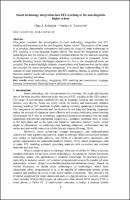Показать сокращенную информацию
Smart technology integration into EFL teaching at the non-linguistic higher school
| dc.contributor.author | Kalugina, Olga A. | |
| dc.contributor.author | Tarasevich, Natalya A. | |
| dc.date.accessioned | 2020-09-17T08:19:35Z | |
| dc.date.available | 2020-09-17T08:19:35Z | |
| dc.date.issued | 2018-01 | |
| dc.identifier.citation | Kalugina, O.A. Smart technology integration into EFL teaching at the non-linguistic higher school / O.A. Kalugina, N.A. Tarasevich // XLinguae; A European Scientific Language Journal. – 2018. – Vol. 11, iss. 1XL. | ru_RU |
| dc.identifier.issn | 1337-8384 | |
| dc.identifier.issn | 2453-711X | |
| dc.identifier.uri | https://rep.brsu.by:443/handle/123456789/193 | |
| dc.description.abstract | This paper considers the investigation of smart technology integration into EFL teaching and assessment at the non-linguistic higher school. The purpose of the paper is to develop, theoretically substantiate and assess the usage of smart technology in EFL teaching at a non-linguistic higher school. The model for integration of smart technologies into the course of «Business Communication» for the students majoring in Economics in an English language learning environment is presented. Some possible blocking factors, challenges educators can face in the educational arena are revealed. The authors highlight didactic characteristics and functions that can be taken into account for smart technology integration. It is noted that understanding of the concept of smart technology integration into EFL teaching, finding an optimal balance between students’ needs and teachers’ professional competence can lead to significant language learning outcomes. | ru_RU |
| dc.language.iso | en | ru_RU |
| dc.publisher | SVO s.r.o. | |
| dc.subject | smart technology | ru_RU |
| dc.subject | integration | ru_RU |
| dc.subject | EFL teaching and assessment | ru_RU |
| dc.subject | language learning environment | ru_RU |
| dc.subject | blocking factors | ru_RU |
| dc.subject | didactic characteristics | ru_RU |
| dc.title | Smart technology integration into EFL teaching at the non-linguistic higher school | ru_RU |
| dc.type | Article | ru_RU |
